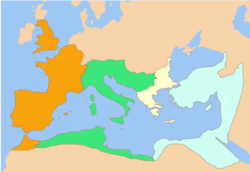- This article deals with the Caesar (335-337). For the censor Flavius Dalmatius, father of the Caesar, see Flavius Dalmatius. For saints with this name, see Saint Dalmatius (disambiguation).
| Flavius Dalmatius | |
|---|---|
| Caesar (18 September 335 – September 337) | |
 | |
| Died | September 337 |
| Dynasty | Constantinian |
| Father | Dalmatius the Censor |
Flavius Dalmatius (died September 337), [1] often spelled Delmatius on contemporary coins, was a Caesar of the Roman Empire from 335 to 337, and member of the Constantinian dynasty.
Dalmatius was the nephew of Constantine the Great. His father, also named Flavius Dalmatius, was the half-brother of Constantine and served as censor. Dalmatius and his brother Hannibalianus were educated at Tolosa (Toulouse) by rhetor Exuperius.

On 18 September 335, he was raised to the rank of Caesar by his uncle, with the control of Thracia, Achaea and Macedonia. Dalmatius died in early summer 337, killed by his own soldiers. It is possible that his death was related to the purge that hit the imperial family at the death of Constantine, and organized by Constantius II with the aim of removing any possible claimant to imperial power other than the sons of the late emperor.